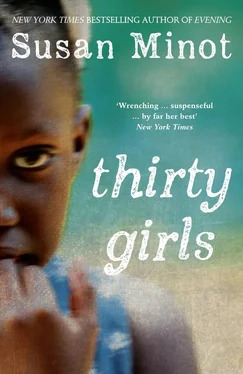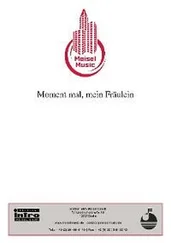He had been with her now three nights and each night in a different bed in a different place. She was in that early lull of physical happiness when going over it was a pleasure, with no real qualms yet. She felt a sinking deeper. And now he was coming with them on her trip. It’ll be what it is, she said to herself, as proof she was without illusion, but having no more idea what It’ll be what it is meant other than a hope against the sinking.
Again departure was postponed so Lana threw another dinner party.
She went into action, arranging what needed to be done, talking to the cook, unruffled and focused. Her energy spread outward and Jane helped her push three tables together and move brass elephants. Lana shook out a long white tablecloth stamped with silver and blue paisley which landed like a sail.
From Jaipur, she said. Lana’s things each had a story—linen napkins were from Porta Portese in Rome, gold-dotted plates passed down from her grandmother in Paris, the striped red and green Venetian glasses from the lover trying to woo her back. That worked, she said, for a while.
The cottage had four small rooms packed like a treasure chest. In her thirty-six years Lana had covered a lot of ground. There were the small business ventures: lanterns from Morocco, the alabaster Indian lamps, the belts with Maasai beading. She’d worked as a set designer and fund raiser, started schools for the Rendille in the bush. Her tastes were both extravagant and rustic. A chandelier hung from a water buffalo horn on the terrace. She was generous whether flush or broke. For all the pleasure she found in things, she did not have the hoarding instinct of the materialist. You liked her bracelet? Here. She would unclasp it from her wrist and snap it onto yours.
She held up a conch shell filled with salt. Sweet, she said. She had dressed for dinner in a short satin slip, boots laced to her knees and dark lipstick. Now, she said, most important, the lighting. They lit lanterns and candles which had been placed in abundance around the cottage on stands and floors and tables crowded with silver cups.
How old is Harry? Jane said.
What do you think?
Twenty-six? Jane said tremulously. Five?
More like twenty-three, darling.
You’re kidding.
Or twenty-two. What, you care? Age doesn’t matter.
It doesn’t?
For dinner there was a platter of grill-marked chicken sprinkled with singed herbs, roast pork beside peeled potatoes, stewed eggplant in tomato sauce, green beans shiny with butter and garlic, curried lentils, ribs, shredded cabbage, sliced avocado. Lana’s housekeeper and another woman carried dishes in and out of the kitchen, taking orders from Lana in Swahili, without seeming to hear them.
By the time the cook’s specialty, coconut flan, was brought out, no one at the table seemed to notice, deep in conversation or having left altogether. Many were out on the concrete terrace, dancing to the turned-up music. By the end of the night however there was no pudding left in the dish. The servants slipped in and out, clearing the plates, leaving glasses and candles and flowers, and a spotlessly washed-up kitchen. The music pounded.
Jane, feeling dazed from drink, from Harry, looked around the room at the people she didn’t know, at ones she barely did, in this place where people returned from war zones, from managing famines, from living in tents among the elephants, or being gored by buffalo, a place where everyone seemed matter-of-factly to lead a life of extremity and daring. Harry was with his parents tonight. They’d just returned from a trip vaccinating livestock before they were to leave again. In his absence, her thoughts of him were more vivid. He was young. He was quite young. She kept thinking of him being young. She remembered how easy it had been at that age to take up with a person. It happened all the time—new people came, you were with them. When they were gone, more new people would come. When she looked at it from that point of view she saw they were no big deal. She thought she’d try to adopt that viewpoint. Adopting other people’s viewpoints, you could convince yourself you were being empathetic—never mind you were ignoring your self.
More people arrived and the dancing grew wilder. One man took off his shirt and was rolling around on the lawn, a dog barking at him hysterically. In between songs you heard the high squawk of an animal, the hyrax who lived and shat on the roof.
Monday morning, readying for departure at last, Jane sat on a bed piled with linen pillows and watched Lana pack. Lana was tall but seemed larger than a normal tall person. She surveyed her room, eyes narrowed, hands on leather shorts. She was accustomed to packing and moving her caravan, but not having to restrain herself in volume. The room was as full as a bazaar, and indeed she had either bought or sold most of the things in it: piles of vintage fabric, leather-trimmed suitcases, necklaces draped on rusted hooks. She picked up an ancient wicker picnic basket with cylindrical holders for wine bottles.
This we take, she said. She opened the lid to show Jane the relics of the 1920s inside—tin plates with embossed leaves, miniature glass salt bottles fitting in felt holders, a silver-rimmed martini shaker.
What else? she said to herself. The tucks on either side of her mouth deepened in concentration. She strode across the room. Unlike some tall people who try to shrink themselves smaller, Lana strode with the confidence of a giant, jangling when she moved. She hoisted a trunk from behind a stand overloaded with brimmed hats and oilskin jackets and fished out a stack of brand new T-shirts. These we bring for the children, she said, and stuffed them in a canvas bag decorated with beadwork, another one of her ventures.
Jane told Harry that Don was coming with them, too. He shrugged. It struck Jane how lightly people here held on to agendas. She was used to a world of people wielding control in order to have things run smoothly which, she noticed, often caused more tension than peace.
Maybe he’ll learn something, Harry said. From Lana.
Jane thought of what Harry had learned from Lana. To fill out the thought, she said, She’s an expansive—Jane was going to say soul but thought it sounded pretentious—spirit.
You mean she sleeps with everyone? Harry did not say it unkindly.
No, I—
Well, she does. He paused then added, Me among them, you know.
Yes, Lana did say … Jane waited for him to elaborate. It seemed that many people here had, if they’d been here long enough, slept with many other people.
Lana’s got a lot to give, he said.
It was a surprise to Jane when someone was not cynical in the least.
Lana was now examining a pair of breakable crimson Moroccan glasses with gold designs. She shook her head and returned them to their hammered brass tray. She found a stack of tin Mexican cups pressed in the shape of bells. Yes, she said, these we can use. It was hard to say which gave her more pleasure—having the things herself, or the thought of offering them to someone else.
When they left Nairobi at last, they got caught in the afternoon traffic. Though if they’d left in the morning it would have been the morning traffic, or in the evening, the evening. There was always traffic around Nairobi, except for late at night when all the cars disappeared and there was no one at all.
Harry drove with Jane beside him. Her body now felt linked to his, and with it came the certainty that his person inside was good and unique and inspiring, regardless of the fact that only a smallest amount of Harry was known to her.
Pierre and Don were in the back on either side of Lana who was tucked into Don’s shoulder. Finally they left the traffic behind and the truck hummed over unsmooth road. The passengers fell asleep, bumping awake over potholes. When Jane woke, her window overlooked a valley dropping off the roadside with houses scattered among greenery and Lake Naivasha a purple disc below. The pink lace at the edge of the gray flats was a flock of flamingos. They stopped at a pull-over overlooking the valley when Lana spotted a display of Maasai blankets strung up on sapling branches, and could determine from a distance they were the old wool ones, not the new polyester blend. A woman sat in the shade with narrow shoulder blades and rectangular beaded earrings and was surprised by Lana’s speaking Maasai to bargain. Harry hunched down to a blanket spread with collar necklaces and belts dangling arrows and beaded leather bracelets. The old bracelets used gut, the new, plastic thread. He bought one, with red and green diagonal bands. Lana pointed out to Don where they were headed, to the right of the lake, her sister Beryl’s house. They were stopping for a night or two. Beryl’s husband Leonard was an artist and Lana was keen to show Don his work.
Читать дальше











